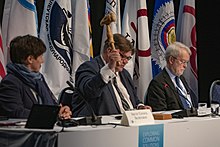Arctic Council
[9][10] The same countries issued a second statement on June 8, 2022 that declared their intent to resume cooperation on a limited number of previously approved Arctic Council projects that do not involve Russian leadership or participation.
Moreover, though only states have a right to vote in the Arctic Council the permanent participants must, according to the Ottawa Declaration be fully consulted, which is close to de facto power of veto should they all reject a particular proposal.
The status of permanent participant is indeed unique and enables circumpolar peoples to be seated at the same table as states' delegations while in any other international organization it is not the case.
[citation needed] At the end of the two-year cycle, the Chair hosts a Ministerial-level meeting, which is the culmination of the council's work for that period.
[citation needed] A formal, although non-binding declaration, named for the town in which the meeting is held, sums up the past accomplishments and the future work of the council.
[35] Each rotating Chair nation accepts responsibility for maintaining the secretariat, which handles the administrative aspects of the council, including organizing semiannual meetings, hosting the website, and distributing reports and documents.
The Norwegian Polar Institute hosted the Arctic Council Secretariat for the six-year period from 2007 to 2013; this was based on an agreement between the three successive Scandinavian Chairs, Norway, Denmark, and Sweden.
[citation needed] In September 2017, Anna Degteva replaced Elle Merete Omma as the executive secretary for the Indigenous Peoples´ Secretariat.
[citation needed] Before signing the Ottawa Declaration, a footnote was added stating; "The Arctic Council should not deal with matters related to military security".
[56] The council is often in the middle of security and geopolitical issues since the Arctic has peculiar interests to Member States and Observers.
The United Nations Convention on the Law of the Sea allows states to extend their exclusive right to exploit resources on and in the continental shelf if they can prove that seabed more than 200 nautical miles (370 km; 230 mi) from baselines is a natural prolongation of the land.
However, Russia requires all commercial vessels to request and obtain permission to navigate in a large area of the Russian Arctic exclusive economic zone under Article 234 of the UN Convention on the Law of the Sea, which grants coastal states greater powers over ice-covered waters.
A poll indicated that half of Canadian respondents said Canada should try to assert its full sovereignty rights over the Beaufort Sea compared to just 10 percent of Americans.
[64] Looking at these two different perspectives, some suggest that the Arctic Council should expand its role by including peace and security issues as its agenda.
A 2010 survey showed that large majorities of respondents in Norway, Canada, Finland, Iceland, and Denmark were very supportive on the issues of an Arctic nuclear-weapons free zone.
[65] Although only a small majority of Russian respondents supported such measures, more than 80 percent of them agreed that the Arctic Council should cover peace-building issues.
[66] Paul Berkman suggests that solving security matters in the Arctic Council could save members the much larger amount of time required to reach a decision in United Nations.
[67] The focus on science and resource protection and management is seen as a priority, which could be diluted or strained by the discussion of geopolitical security issues.
[69] This response highlighted deeper divisions between Russia and the Western bloc within the Council, straining the inclusivity that had previously characterized its operations.
Despite these challenges, the Council successfully transitioned its chairmanship from Russia to Norway in 2023, demonstrating its capacity to maintain institutional continuity under difficult circumstances.
While originally focused on environmental protection and sustainable development, the Arctic Council now finds itself grappling with the broader realities of global power politics and their impact on regional governance.
Observers include non-Arctic states such as China, Japan, and South Korea, alongside intergovernmental and non-governmental organizations.
[75] These tensions reflect the challenge of balancing inclusivity with the need to safeguard regional interests, a dynamic that has become increasingly prominent in the Council’s activities.
[77] These portrayals have contributed to broader geopolitical concerns, despite evidence that China has largely adhered to the Council’s cooperative norms.
[78][79] While such narratives have heightened attention to the Arctic’s strategic importance, they often oversimplify the Council’s efforts to maintain neutrality and collaborative governance.
These dynamics illustrate the increasing complexity of balancing the Arctic Council’s original mission with growing global interest in the region.


